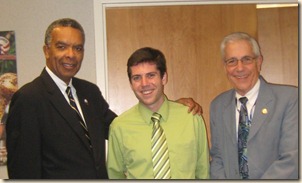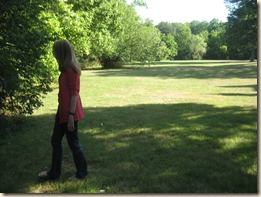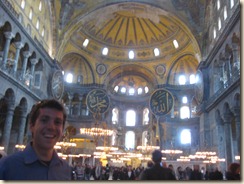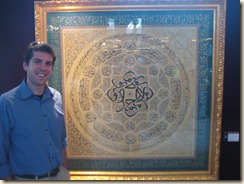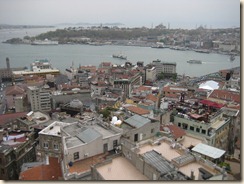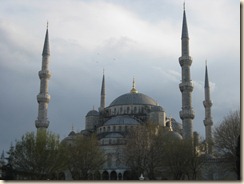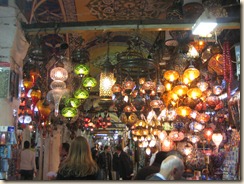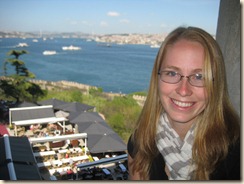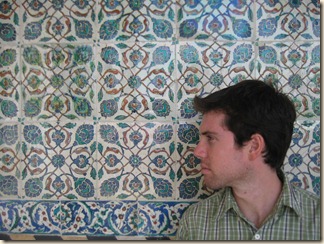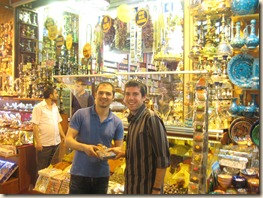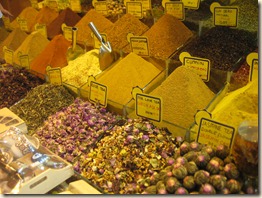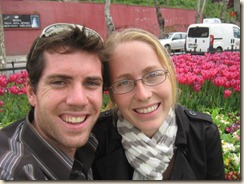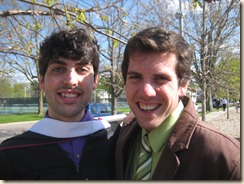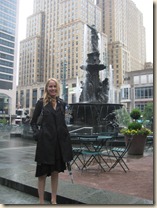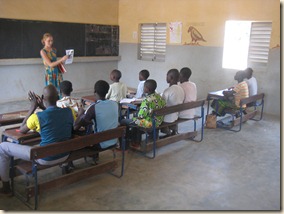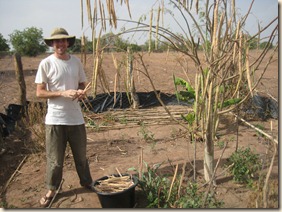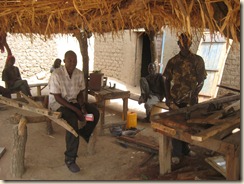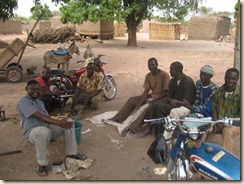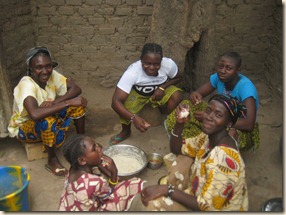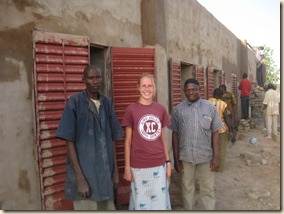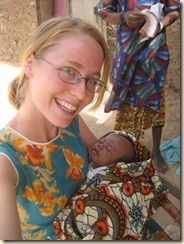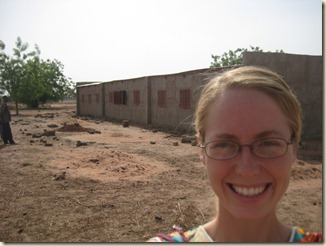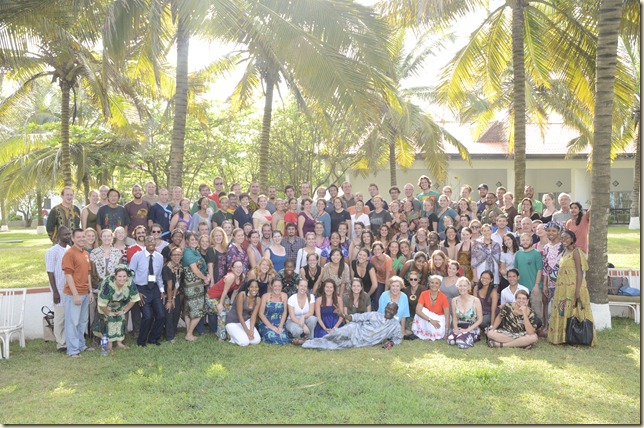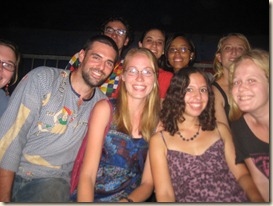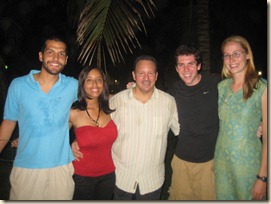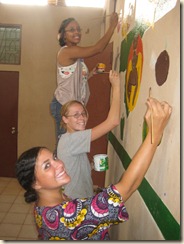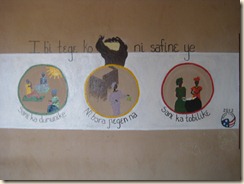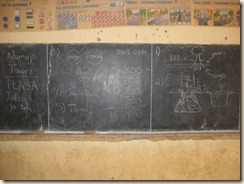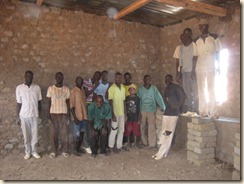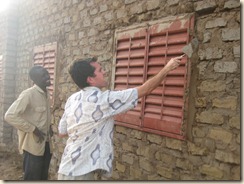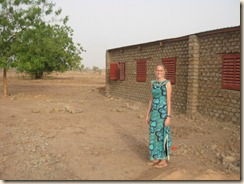Saying goodbye is never easy, even under normal circumstances. That’s because we fear that when we say goodbye, we may 1) never see an individual again, or 2) see them again, but not get along, because people change. We are really wishing farewell to times shared together, which can always be remembered, but never relived. And that’s difficult.
Saying goodbye to our village too soon, as a result of the unexpected political changes in Mali over the past few weeks, has been one of the most challenging experiences of my life. Describing it seems equally as daunting as I am not sure I have truly dealt with it emotionally. I guess I always imagined that an evacuation would involve an adrenaline rush and maybe a helicopter rescue, but the reality was dealing with an anxiety of uncertainty and attempting to control what events I could. Throughout this entire ordeal, The Serenity Prayer has echoed in my head: “Lord, grant me the serenity to accept the things I cannot change, the courage to change the things I can, and the wisdom to know the difference.”
A few days after the coup d’etat (which you can read about in earlier posts), all Peace Corps volunteers got a message to consolidate to their regional capitals as a precautionary measure. Most of us figured that it was to simplify communication during an uncertain time and that we would be released in a few days. However, as the days added up from three, to six, to ten, we began to realize and fear that we may have already visited our village for the last time. For Joye, this meant not seeing her mudbrick school completed, and leaving behind so many unsaid thank-yous. For me, it meant being literally one day away from finishing the financing for a tree-planting project – it should have already been done, but the coup closed the banks on my last day in Duguba. With trouble in the north, and the threat of economic sanctions placed on Mali due to the coup, we distracted ourselves with painting mural and satirical blog posts (see prior entries) to avoid thinking about evacuation.
Then around dinnertime on Sunday we got an important email, which I read aloud to the nine young women of the Koutiala transit house who had been waiting with us for ten days. It said that we could go back to our villages until Friday, but volunteers in the region bordering the northern provinces had to be consolidated to the capital Bamako. Of course, we got ready to go back to Kongodugu, but the situation did not leave us confident that our return would be for long. Joye and I had a heart-to-heart, and decided that we would try to spend every remaining moment in Kongodugu as if it could be potentially be our last, which emotionally, is far easier said than done. But unlike some volunteers, we had control over this time, and therefore we were determined to maximize what time we had left.
But saying goodbye when you are not certain you are leaving is a difficult task. This is especially true in Mali, where people don’t talk about “just in case” scenarios, as they believe that even talking about the possibility of something bad happening makes it more likely to happen. So we stayed hopeful in our conversations, attempted to greet our closest friends, and share an intimate moment with them that in hindsight could be seen as a goodbye. On Tuesday, Joye held newborns, chatted with elders, took pictures of friends, thanked our host family, and encouraged the workers finishing up the school. She found that even the threat of being pulled out early, before we had intended to leave, made her appreciate our small and dusty village for the home it had become.
Meanwhile, I rode to Duguba to finish paying for my tree-planting project. I had already collected a quarter of the money from 25 community organizations, and if I left without delivering my share from a USAID grant, I would have been accidental thief – talk about regrets! The urgency of finishing this work only increased as I recieved periodic call throughout the morning: more volunteers being called in to Bamako, and then an order to return to Koutiala tomorrow, a full 3 days early.
Eating lunch with my work partner Rube, I began speaking as if this would be the last time I’d be helping with this work. I explained that it would be silly to talk this way if I came back next week, but horrible to not talk this way if we were evacuated. He understood, and moreover, he assured me that the work would continue without me. These 2,000 trees, he said, are going to be planted throughout the entire commune, and he promised that he would visit the villages once a month until it has happened. Knowing that he was going to finish the work, even without me, was a great comfort and relief that forced me to choke down tears.
After lunch, Rube and I went to greet the village chief, followed by Liddy, the president of the women’s association who I worked with also. I tried to explain the situation to Rube’s wife, who makes some of the best rice and onion sauce in Mali (so many vegetables!), but she wouldn’t hear it. I thanked her repeatedly anyway. Finally, I bought a round of sodas for Rube and his friends, drank one, shook hands a bit longer than normal and left.
Back in Simona, Joye and I were trying to interpret the intent behind re-consolidating to Koutiala, and going crazy. We found a way rig our cell phone to a branch of our mango tree so that it received a few bars of cell reception, which is ironic considering that we had suffered for over a year and six months without finding that branch. But it turns out the branch only made us suffer more. At dusk, the phone rang, and we learned that Peace Corps Mali was officially being evacuated. We had ten hours, a house to inventory, a village to greet, and as luck would have it, no charge left in our solar battery which lights up our house at night.
Dorro came over just after the call. It was appropriate that he heard the news first. Dorro had been our best friend in village these two years, as our work partner and host father, and if were not for his help, patience, hospitality and leadership, none of our work could have been accomplished. We told him this as he sat mournfully under our hangar, which his own family built for us, and then we tried to explain what happens next – that we’re going to try to recommend another volunteer for Kongodugu who will take most of our stuff, assuming of course that Peace Corps returns after the conflict is over. Maybe within the year, maybe five. Dorro gave blessings in support of the former. He left after dark, but promised to meet us the next morning.
We then decided that because we could not bid farewell to everyone, we needed to say goodbye to the entire village through the village chief. Heavy and tense, we made our way in the dark to the village center, around the empty market, past the mud mosque. Soulymane greeted us with his usual enthusiasm and the school-building mason Karim was also there. Choked with emotion, Joye had asked me to explain, which I did. I also asked them not to share this information for a few days, until we were gone for good. Soulymane walked us all the way home, showing us the road, as they say.
Needless to say, it was one of the most exhausting nights we had ever lived. I had planned on not sleeping, but fell victim to it eventually. Not sure what Peace Corps would be able to pick up later, we packed up everything we wanted, threw out trash, attempted to organize the remains for the next volunteer, and make inventory of what could be donated to villagers. Ideally, we had allotted our final three months to do this, but we got three hours instead. Admittedly interrupted with tearful hugs of encouragement, we did the best we could.
The next morning - our final hour in Kongodugu – we took a final walk into town. The twin Baobob trees near the market, tall and thick and powerful, were stark silhouettes against the pale dawn. The village was only just stirring; the sounds of women pounding their daily meals came in sporadically from all directions. Then Joye reminded me of one person we had yet to greet, Tie Sanou, the wise and respected village blacksmith and elder who had always welcomed our company and supported our service. We found him eating breakfast and quickly shared the news. And to our surprise, he reacted in a way that no elder is supposed to; he voice quivered, his eyes watered, and that was it, but it was enough. We gave us many blessings for future health, many children, and long life, and then showed us the road as well. His was the village’s final gift to me, and I will never forget it.
For us, the day we left Kongodugu was the day we left Mali. After Tie’s farewell, Joye finally gave in and hugged a Malian, our neighbor Miriam, which we probably culturally inappropriate but neither seemed to care. Dorro came and tasted his first Oreo cookie as he loaded up our luggage onto his motorcycle. We followed him on our bikes, past the mudbrick school with its newly finished exterior, along the 45-minute dirt path to the main road. Dorro waited with us until a public bus arrived, helped us load our things, then gave us solemn blessings and a firm handshake. His eyes followed the bus as we pulled away.
Everyone handles goodbyes differently, but no one does it well. We learned this during the next two weeks, which were spent with Peace Corps Mali’s remaining 180 volunteers either waiting at our training facility outside Bamako or at the evacuation transition conference in Accra, Ghana. Many were in denial, some stricken with regret, others completely aloof in public but strangely somber in private. Some felt guilty for abandoning Mali, though their hearts were the most innocent of us all. Even though the evacuation was in fact a thing we could not change, it was hard for us to understand that, and then moreover, be at peace about it. Funny how the human race has invented the wheel, boats, the telephone, electricity, airplanes, and iPhones, but we still haven’t invented a social construct that makes it easy to find peace in unexpected goodbyes and their unintended consequences.
Of course, the other stress weighted on us Peace Corps volunteers was what to do with our lives now that our expected time in Mali has been severed. Over the course of the transition conference in Ghana, some of our volunteer friends were able to transfer to other Peace Corps countries while others made plans to travel or return home. Much like our friends in Kongodugu, we hope that distance will not separate the bond that we have formed during this life-changing experience. We hope that, in fact, we will meet again, and that when we do we will find that we have changed for the better.
And truly there is much to be thankful and hopeful for. Unlike many volunteers, Joye and I had a chance to return to our village, finish our work, and say goodbye, a opportunity for which I will be eternally thankful. And while many volunteers did not find closure in their Malian communities, the transition conference allowed us to find closure amongst each other and, furthermore, to build a support network that will help us transition to life back in the United States. This has been hard, but we have been blessed, and so now our prayers return to Mali.
Goodbye Mali, for now. Get well, and God willing, we will see you soon.
-James (& Joye) Allen
